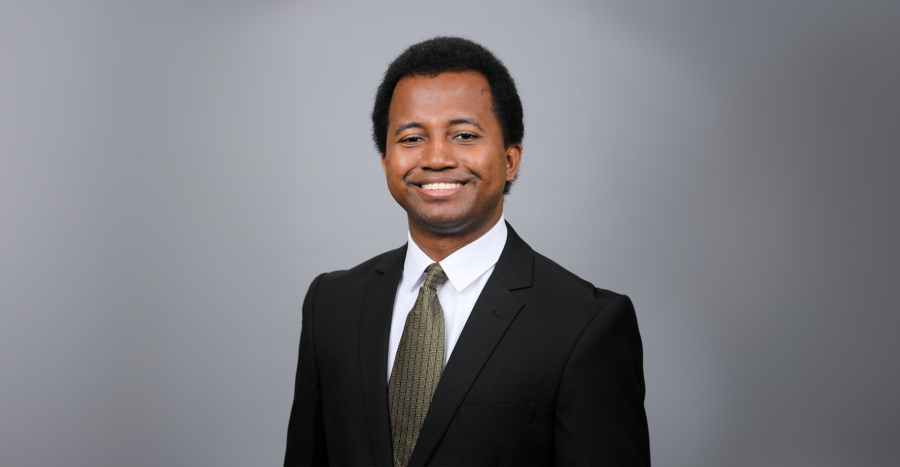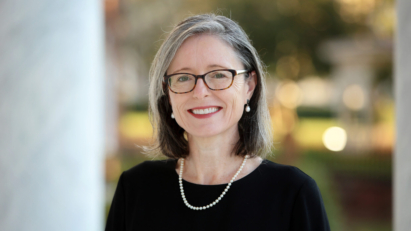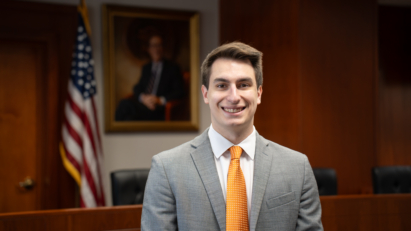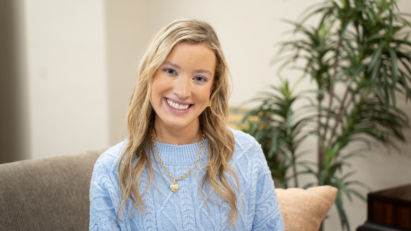Meet 3L Student Lee Wilkes, II

Originally from Los Angeles, CA, but raised in Georgia, Lee Wilkes, II, ’25, is a biomedical engineering graduate from Georgia Institute of Technology who minored in French. In addition to serving as treasurer for the Black Law Student Association (BLSA) at Mercer Law School, Wilkes spent the spring semester in a remote internship with Georgia PATENTS. This summer he is interning with Judge Kara Stoll, U.S. Court of Appeals Federal Circuit in Washington, D.C.
What led you to law school and a career in the legal field?
Originally, I wanted to become a doctor. My parents are in the medical field, so I wanted to follow my dad’s footsteps; however, I learned that I didn’t like the daily interactions with patients. So, I ended up going into engineering, where I studied biomedical engineering… but found that I didn’t like the day-to-day paperwork that most engineers have to do on top of constant testing. I got into law because I discovered patents when I was doing my capstone project, and it sort of stuck with me.
What kind of law are you interested in practicing?
I want to do intellectual property, though more specifically, I’m pretty sure that I want to do patent law. It was the main drive for me to go into law school, and from what I’ve experienced so far, there’s something new almost every day. The Constitution set in place the need to protect a person’s ideas and creativity, and so patents, trademarks, and copyright were born. I want to protect those aspects because unlike land and physical property, your own creativity is harder to protect. Besides, I really enjoy hearing about new things and new ways of approaching stuff, so it’s a win-win!
What did you do during your spring internship at Georgia PATENTS?
Firstly, Georgia PATENTS is a legal aid program that helps under-resourced inventors pair with pro bono attorneys to get a patent. It was remote work, and I got to do a lot of things. There, I helped with client intake, analyzing their prior art (basically similar products and things that already exist), and interview the clients to see if they meet the program’s requirements. From there, if they qualified, we marketed each client’s cases to pro bono attorneys who signed up to our program, where they would help them at least create and file a patent application. Most of the pro bono attorneys helped the client all the way through patent prosecution (the application process for patents).
This summer, you are interning with Judge Kara Stoll, U.S. Court of Appeals Federal Circuit. How did you learn about the internship? What do you expect to be doing?
I signed up for the Judicial Intern Opportunity Program run by the ABA, which is a program that can pair you with a judge. It’s a great program to give law students the opportunity to get court experience one way or another (be it state or federal). Based on my background, I was lucky enough to be chosen by Judge Kara Stoll. It’s a wonderful experience, and I’m already learning a lot! The Federal Circuit does patent-related cases, so I’m hoping to focus on that area and learn the practicalities. It’s a great experience to learn and practice my legal research and writing skills, which will be used once I become an attorney.
Why did you choose Mercer Law?
Coming out of a large undergrad campus, I knew that I needed to go to a place with a smaller class size to better understand what was going on. Mercer was the best choice, as it was both small and very communal. One of the best parts about Mercer is that I get to visit professors easily – often not having to schedule an appointment for two weeks in the future. I can often just walk into their office if their door is open, ask a few questions, or talk to them about random things. It’s a great experience overall.
What’s the best thing about Mercer Law?
It has to be the community. It’s a small group of people going in, so everyone knows everyone by the end of the year. This helps build connections with each other, as well as making the learning more personal. Everyone I know helps each other, be it through advice or otherwise. Of course, there are some aspects of academic rivalry that come with any school; however, at the end of the day, we understand that everyone we’re interacting with is going to be a future colleague, and the relationships we make here are going to help us in the future


